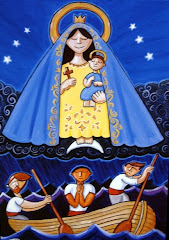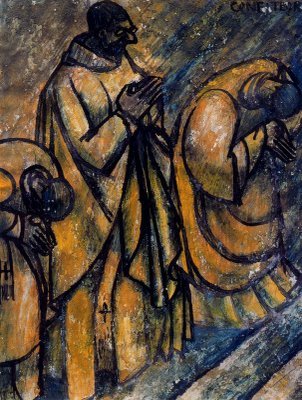
The 3rd appearance (18 February):
"The third time was the following Thursday. The Lady only spoke to me the third time. I went to the grotto with a few matured people, who advised me to take paper and ink, and to ask her, if she had anything to say to me, to have the goodness to put it on paper. I said these words to the Lady. She smiled and said that it was not necessary for her to write what she had to say to me, but asked if I would do her the favor of coming for a fortnight. I told her that I would. She told me also that she did not promise to make me happy in this world, but in the next."
Although she spoke in Occitan, the regional language which Bernadette (whose French was poor) used, the apparition used remarkably formal language in her request: "Would you have the goodness to come here for fifteen days?" (in Occitan: "Boulet aoue ra gracia de bié aci penden quinze dias?"; in French:"Voulez-vous me faire la grâce de venir ici pendant quinze jours?") The significance of this politeness was not lost on the observers. It would be very unusual for anyone to adopt this formal form of address when speaking to a penniless, working-class peasant girl such as Bernadette.
The 4th appearance (19 February):
The 5th appearance (20 February)
Thirty people were present. Bernadette reported later that the lady had taught her a prayer, which she said every day of her life, but never wrote down or repeated to anyone. By this time, the news was spreading to other towns, and many people assumed that Bernadette's lady was the Virgin Mary, although Bernadette herself seemed content not to try to establish her identity.
The 6th appearance (21 February):
Over 100 people were present, and Bernadette was afterwards interrogated by Dominique Jacomet, the Police Commissioner. Her father, François Soubirous, eventually assured the commissioner that the affair would cease.
The 7th appearance (23 February):
About 150 people were present. Jean-Baptiste Estrade (a tax inspector), Duffo (a court official), and the officers from the garrison were present. Bernadette said later that the lady had told her a secret, which was for her alone, and was never revealed to anyone.

